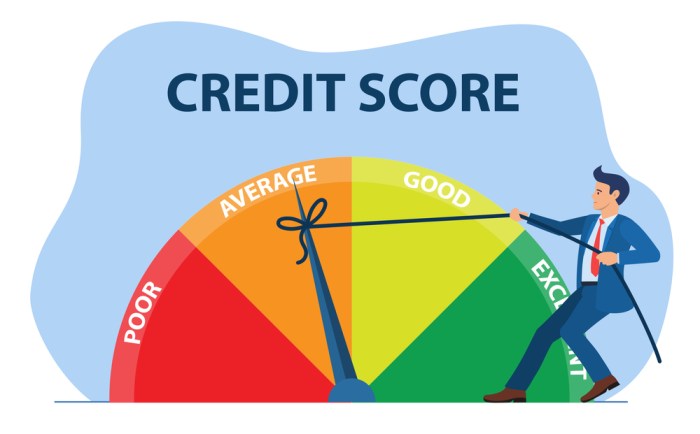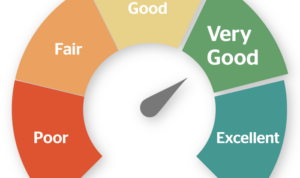Credit Score Improvement sets the stage for financial success, diving into the nitty-gritty of what it takes to enhance your credit score and secure a stable financial foundation. Get ready for a ride filled with tips, tricks, and myth-busting insights that will transform your credit game!
From understanding the basics to implementing advanced strategies, this guide will equip you with the knowledge needed to take control of your credit score and pave the way for a brighter financial future.
Understanding Credit Scores: Credit Score Improvement

A credit score is a three-digit number that represents a person’s creditworthiness. It is calculated based on various factors related to an individual’s credit history and financial behavior.
Having a good credit score is crucial as it can impact your ability to borrow money, secure a loan, or even rent an apartment. Lenders use credit scores to evaluate the risk of lending money to a person and determine the terms of the loan.
Factors Impacting Credit Scores
- Payment History: Making on-time payments on credit accounts can have a positive impact on your credit score. On the other hand, late payments or defaults can lower your score.
- Credit Utilization: The amount of credit you are using compared to your total available credit limit can affect your score. Keeping your credit utilization low can improve your score.
- Length of Credit History: The longer you have had credit accounts open, the better it is for your credit score. It shows a track record of responsible credit use.
- Credit Mix: Having a mix of different types of credit, such as credit cards, loans, and mortgages, can positively influence your credit score.
- New Credit Inquiries: Applying for multiple new credit accounts within a short period can signal financial distress and lower your credit score.
Strategies for Credit Score Improvement

Improving your credit score is essential for financial health and future opportunities. By implementing the right strategies, you can boost your creditworthiness and open doors to better loan terms and financial options.
Benefits of Paying Bills on Time
Paying your bills on time is crucial for improving your credit score. Late payments can have a significant negative impact on your credit history and lower your score. By consistently paying your bills on time, you demonstrate financial responsibility and reliability to creditors.
Relevance of Maintaining a Low Credit Utilization Ratio
Your credit utilization ratio is the amount of credit you are using compared to the total amount of credit available to you. It is recommended to keep this ratio below 30% to positively impact your credit score. High credit utilization can signal financial instability to lenders, while a low ratio showcases responsible credit management.
Monitoring and Managing Credit Score
Monitoring and managing your credit score is crucial for maintaining healthy financial habits and improving your creditworthiness over time.
Tools and Methods for Monitoring Credit Score, Credit Score Improvement
- Utilize free credit monitoring services provided by credit bureaus like Equifax, Experian, and TransUnion.
- Sign up for credit monitoring apps or websites that offer regular updates on your credit score and report changes.
- Set up alerts for any suspicious activity or sudden drops in your credit score to address issues promptly.
Significance of Regularly Reviewing Credit Reports
Regularly reviewing your credit reports is important in ensuring the accuracy of the information and detecting any errors or fraudulent activities that could negatively impact your credit score.
Remember, errors on your credit report can lead to lower credit scores and affect your ability to secure loans or credit cards.
Ways to Manage Credit Responsibly
- Pay bills on time to establish a positive payment history.
- Keep credit card balances low and avoid maxing out your credit limits.
- Avoid opening multiple new accounts within a short period, as it can signal financial distress to lenders.
Credit Score Myths and Misconceptions
When it comes to credit scores, there are several myths and misconceptions that can lead to confusion and misinformation. Understanding the truth behind these myths is crucial for making informed decisions about your credit.
Closing credit accounts may not always be beneficial for credit score improvement. While it may seem logical to close unused accounts to simplify your finances, doing so can actually harm your credit score. Closing accounts can affect your credit utilization ratio, which is an important factor in determining your credit score. It’s best to keep credit accounts open, even if they are not actively being used, to maintain a healthy credit mix and utilization ratio.
Impact of Checking Your Own Credit Score
Checking your own credit score, also known as a soft inquiry, does not have a negative impact on your score. In fact, it’s important to regularly monitor your credit score to stay informed about your financial health and detect any potential errors or fraudulent activity. By checking your own score, you can take proactive steps to improve it and ensure that you are on the right track towards financial stability.
